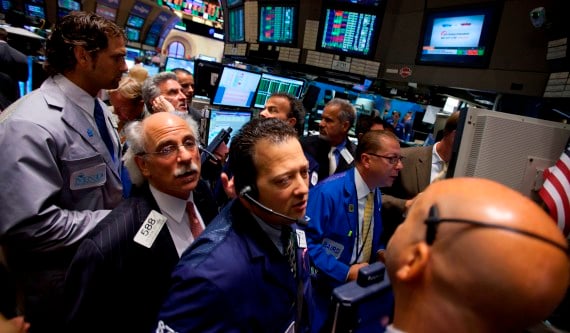As the stock market extends its pattern of extreme volatility, down nearly 4% in midday trading, market strategists and money managers are pointing to the obvious disconnect between perception and reality.
“It's very hard to tell investors right now that equities are cheap or that dividend yields are at extremely attractive levels,” said Brian Gendreau, market strategist at Cetera Financial Group Inc., which has $82 billion under management.
Mr. Gendreau added that dividend yields are now higher than “Treasuries and most corporates for the first time since the 1950s.”
Meanwhile, he is not ignoring the obvious psychological impact of the latest round of negative economic reports, including weaker employment, home sales and manufacturing data.
“I thought after last week that the worst was over, and now here we are again,” he added.
But even as 400-point stock market swings can be jarring, it's important to realize that this kind of volatility can't last much longer, according to Rob Stein, senior portfolio manager at Astor Asset Management LLC, which manages $1.5 billion.
“There's a lot of uncertainty out there, but I don't think we're going to be experiencing this kind of volatility deep into the fourth quarter,” he said. “Because of what happened in 2008, people just sell first and ask questions later.”
That knee-jerk reaction is ignoring much of the underlying strength in the economy, Mr. Stein explained.
“At the end of the day there are some head winds, but the economy is performing,” he said. “Things are worth less, but they're not worthless.”
(Adviser poll: Do you think the market have already experienced their 2011 lows?)
With the S&P 500 having already lost half its value twice in the past decade, it is not surprising to see investor fear on the rise in times like these, but comparisons to 2008 are unfounded, according to Tom Villalta, portfolio manager at Jones Villalta Asset Management.
“The economic news lately is not too surprising, nor is it new news,” he said. “This is just one in a long line of over reactions this quarter when we're seeing uncertainty drive things rather than underlying fundamentals.”
In terms of fundamentals, Mr. Villalta pointed out that the contrasts between now and the crisis of 2008 are stark.
“Companies have adjusted their costs and they're in far better shape now,” he said.
The financial sector, for example, “is one of the most disparaged and aggressively negative categories,” he said. “But we believe banks are more than adequately capitalized and they're just being punished by short-term views.”
Indeed, the economy was measured at negative 6.5% growth in 2008, when the S&P 500 fell 37%, Mr. Stein pointed out, while it is growing by 1.3% currently.
“Interest rates are low and the economy is growing, so I see this volatility and it's not consistent with what's happening in the economy,” he said. “These are like aftershocks, but we're really going nowhere, because it's just volatility for volatility sake.”
Quincy Krosby, market strategist at Prudential Financial Inc., believes the market will calm down eventually. She pointed out that the period from August through October has traditionally been a period of increased volatility.
“Right now there are some very strong companies that are just being thrown out,” she added. “So the question is whether to go in now or wait for the dust to settle.”
In the meantime, there is one odd positive to the market's most recent beat down: there will likely be less effect on stocks if economic fundamentals do start to deteriorate badly.
“Even if we do head into a recession,” said Mr. Stein, “it would appear that most of the damage has already been done from a market standpoint.”







